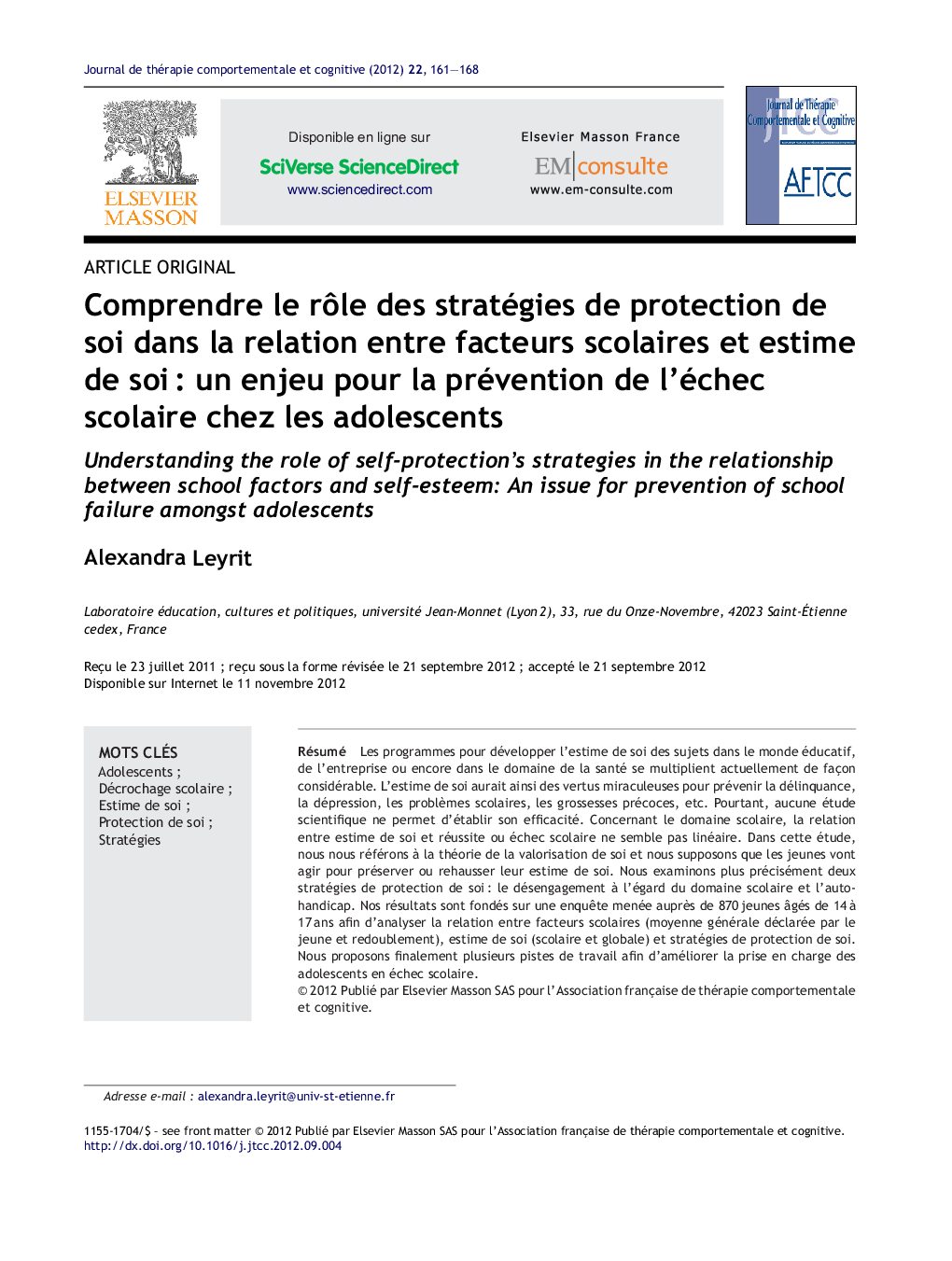| کد مقاله | کد نشریه | سال انتشار | مقاله انگلیسی | نسخه تمام متن |
|---|---|---|---|---|
| 934307 | 923636 | 2012 | 8 صفحه PDF | دانلود رایگان |
عنوان انگلیسی مقاله ISI
Comprendre le rôle des stratégies de protection de soi dans la relation entre facteurs scolaires et estime de soi : un enjeu pour la prévention de l'échec scolaire chez les adolescents
دانلود مقاله + سفارش ترجمه
دانلود مقاله ISI انگلیسی
رایگان برای ایرانیان
کلمات کلیدی
موضوعات مرتبط
علوم پزشکی و سلامت
پزشکی و دندانپزشکی
روانپزشکی و بهداشت روانی
پیش نمایش صفحه اول مقاله

چکیده انگلیسی
Self-esteem is a topic, which generates a great deal of interest in the world today. Therapies aimed at developing positive self-esteem are currently increasing dramatically in schools, businesses and in the field of healthcare. Self-esteem is thought to have miraculous healing powers to prevent delinquency, depression, problems in school, teenage pregnancy, etc. Nevertheless, there are no scientific studies proving its effectiveness (Sedikides and Strube, 1997; Famose and Bertch, 2009) [3,13]. In the field of education, the relationship between self-esteem and academic success or failure is not clearly established. We examine the relationship between school factors and self-esteem, taking into account the multiple facets of self-esteem. Individuals view themselves differently depending on the areas of life (work, school, sports, etc.), and these specific views, in turn, influence global self-esteem in different ways. In this study, we also refer to the theory of self-actualization (Leary, 2007) [6] and we assume that young people will act to preserve or enhance their self-esteem. We look more closely at two strategies of self-esteem preservation: disinterest in school and self-handicapping. The first strategy is characterized by a lack of respect for education. Self-handicapping is expressed in terms of behavior and consists of providing minimum effort or acting negatively at school. These strategies lessen the negative effect school life can have on self-esteem. We conducted a survey of 870 young people aged from 14 to 17. This study was carried out as part of research by the Convention industrielle de formation par la recherche (CIFRE). Its aim was to analyze the relationship between self-esteem and academic factors (average grades as declared by the young person and retention), taking into account on one hand academic self-esteem and, on the other, strategies of self-preservation. The results showed that academic factors significantly affected academic self-esteem yet they did not influence global self-esteem. An analysis of variance by comparing average grades specified that academic self-esteem increased linearly according to the average grade as declared by the young person (F [4.779] = 127.38; P < 0.001). Young people who had never repeated a year also had higher academic self-esteem than retained students. Young people with poor academic performance tended to have global self-esteem comparable to those who were successful. The global self-esteem of these young people appeared to have been protected from the negative influence of poor academic performance. We also presume that self-handicapping and psychological disinterest in school activities moderates the effect of academic self-esteem on global self-esteem. We analyzed two populations: young people with high and low self-esteem at school. Although no explanatory model of global self-esteem was apparent from our linear regressions, our results suggested significant differences with regard to the age of the subjects. The influence of academic self-esteem on global self-esteem was present among younger students (< 14 years, r = 0.30, P < 0.001), whereas it was not significant in older students (â¥Â 14 years). With regard to young people with low academic self-esteem, self-handicapping (β = â0.16; t = â3.88; P < 0.001) moderated the negative effect of low academic self-esteem (β = 0.36; t = â3.69; P < 0.001) on global self-esteem. Young people who self-handicap by putting in minimum effort at school had better global self-esteem than others. Psychological (dis)interest did not appear in explanatory models of global self-esteem. Undoubtedly, young people find it more difficult to become disinterested in education, which is highly valued by our society (Harter, 1986) [8]. We also discuss the effect of academic factors and academic self-esteem on global self-esteem and suggest several working methods to improve support for adolescents with poor academic performance.
ناشر
Database: Elsevier - ScienceDirect (ساینس دایرکت)
Journal: Journal de Thérapie Comportementale et Cognitive - Volume 22, Issue 4, December 2012, Pages 161-168
Journal: Journal de Thérapie Comportementale et Cognitive - Volume 22, Issue 4, December 2012, Pages 161-168
نویسندگان
Alexandra Leyrit,